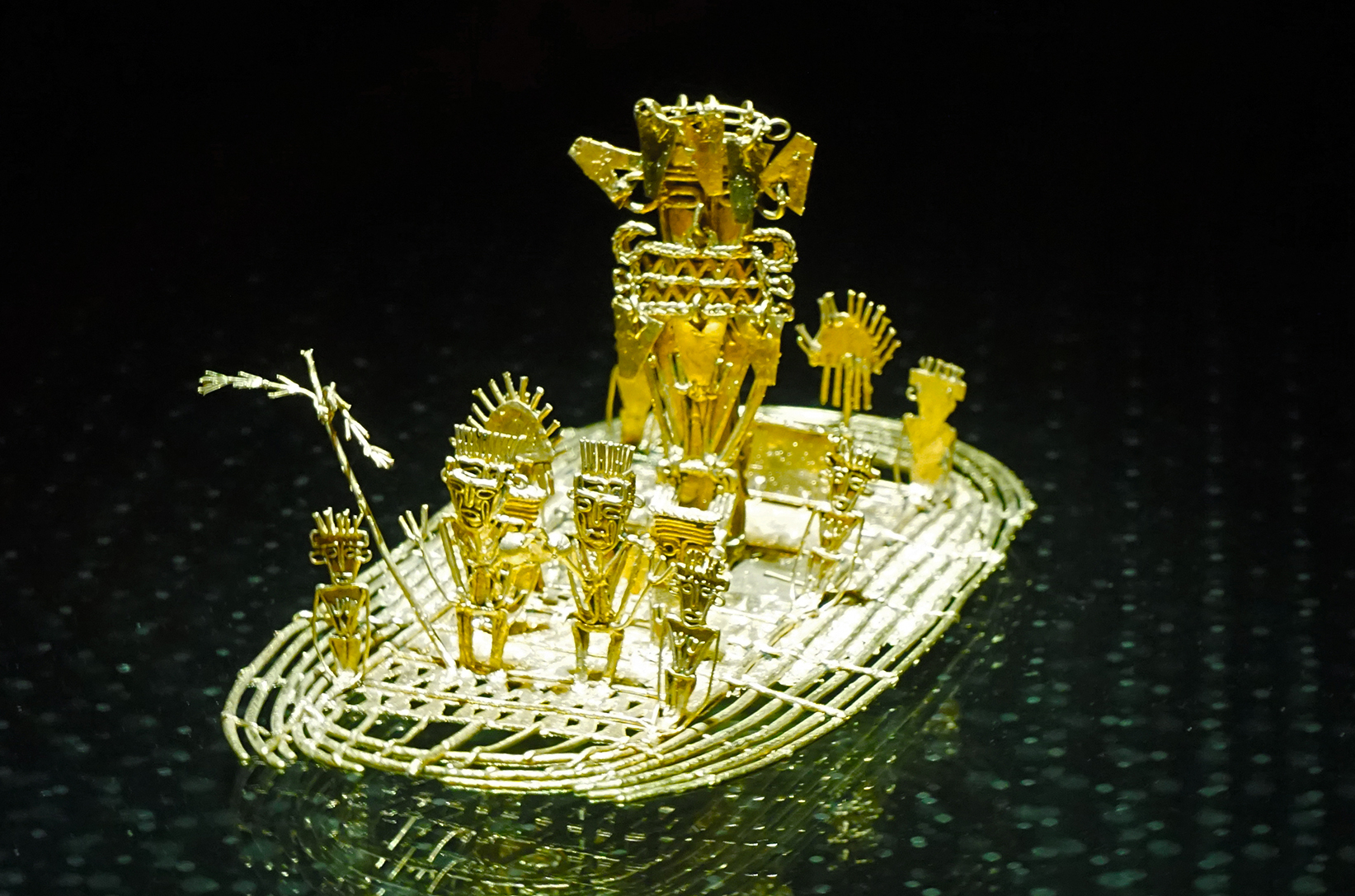
Tisquesusa became zipa—ruler—of the southern Muisca Confederation in 1514 after his uncle died. The Muisca Confederation was one nation of people that was ruled by different people in the north and south. By rule of the Muisca line of succession, the zipa’s oldest sister’s oldest son always became the next zipa.
Tisquesusa was as ready as he’d ever be. His family had just come out of mourning for his uncle, who had been mummified and laid to rest only a few short days before with pottery, food, golden ornaments, and other afterlife necessities carefully laid by his side in a princely tomb. Tisquesusa had spent the last days fasting and felt weak but purified, as he should. The ceremony was about to start and Tisquesusa solemnly boarded the raft with his attendants and the village holy men by the shores of Lake Guatavita.
When they had reached the proper point of the lake—about chestdeep—Tisquesusa slowly dropped his ceremonial robe and allowed the priests to cover his body in a sticky sap before they covered him from head to toe in gold dust until he shone and sparkled like the Sun god himself. Slowly, carefully, Tisquesusa lowered himself into the waters of the lake and submerged, purifying himself for his people, for the quality of his reign, and for the goddess of the lake. The people on the shore and those on the raft began to shower the lake with more gifts of gold and of emeralds.
Back on the shore, now absolved of the solemn ceremonies of the day, the atmosphere became celebratory and the Muisca people were now excited to feast and revel, for it was not every day that the Muisca inaugurated a new zipa. Tisquesusa, however, had one more traditional ceremony to attend.
Tisquesusa ducked as he entered the low door of the hut belonging to the mohan named Popón. The ancient mohan bowed his head, hunched over his crossed legs and stayed there until Tisquesusa began to worry that the old seer had fallen asleep. Popón took a deep rattling breath and said: “The men will come from far, you will not know their kin nor their gods. They will bear sharp weapons that bite like lightning and sound like thunder, the likes you have never seen before. You will not be able to stop them and you will die bathing in your own blood.” With that the mohan looked to the door and Tisquesusa knew it was his cue to leave, though he longed to ask questions.
Tisquesusa slowly walked back to the revelers, but Usaca, who had been watching for him, caught him by the arm before he could enter the crowd.
“What is it, big brother?” Usaca lisped. Not yet five, the young girl was wise beyond her years and her worry was apparent in her eyes.
“My beautiful sister, your loveliness could stop the rain if you looked at the sky. Are you not happy to see your brother at his zipa ceremony?”
“Tell me, please, was it something the mohan said that makes you look so worried? What was it? What did he say?”
“He…” Tisquesusa paused—how could he tell this little girl of the horrors awaiting him? “He said nothing unusual, dear sister. Come, let us celebrate together the continuation of our family and of the Muisca people.” Tisquesusa put his arm around his sister and guided her toward the feast, which he no longer felt hungry for despite his days of fasting.
Time and distance helped Tisquesusa lose his deep sense of dreading. As the years passed, he began to enjoy life again, always hoping that the old mohan was wrong. He married, had children, ruled, and lived life through its ups and downs.
And so the years passed for the zipa of the Muisca people, more than twenty years gone. Then one day, it happened, and the dread of the old mohan’s prophesy came rushing back to him as if he had just left the old man’s hut minutes before.
Foreigners, never before seen, had appeared on the shores of Colombia. His network of spies told him that they carried frightening new weapons. They wore shells of metal and rode great four-legged beasts that snorted and screamed as they ran. Tisquesusa felt defeated before the foreigners even arrived in his town. He retreated with his troops from the capital of Bacatá (which would later become Bogota) to his fortified palace in Cajicá.
Running to catch Tisquesusa and his troops before they left, Usaca called out breathlessly “Dear brother, wait!” Tisquesusa paused though he was in mid-sentence with one of his generals. He pulled his sister to the side so that they could talk privately.
“Tisquesusa, why do you run? You have ruled powerful and mighty for more than 20 years, you can beat these invaders, I know you can,” Usaca uttered breathlessly.
“No, my beautiful sister, I am trying to draw them away from the city. These invaders we cannot beat.”
Usaca was stunned. She hugged her brother fiercely and let him leave without another word, for she truly could think of nothing to say. Days passed and rumors floated back to the city. The zipa’s troops had engaged in battle and the Muisca price was high. Hundreds of warriors had been killed, their own weapons barely making a dent in the armor of the foreign enemy.
Then, at dawn one day, Tisquesusa and his remaining troops returned to the city. The tired and bloodstained zipa ordered his citizens to evacuate Bacatá. The citizens fled to the settlements of the Bogotá savanna, where Tisquesusa’s children hid Usaca—for her future son would be the next zipa.
Tisquesusa and his troops fled north to draw away the invaders. They hid in the hills in the north, but were soon discovered. They came in the dead of night, these harbingers of thunder and lightning. They loved to kill and they loved gold, that was all that was known about them. Tisquesusa, always battle-ready and dressed in his golden armor, heard the unusual rustling in the night and slipped out of a secret door in the back of his hut. But the moon glinted off his golden breastplate and he was discovered. He felt a sharp pain in his side as he was stabbed by an invader’s long sword. Luckily (was it luck?), the solider didn’t recognize the zipa and was only interested in his golden breastplate, which he pulled off of Tisquesusa while he lay panting on the ground. Bleeding heavily from his wound, Tisquesusa rallied himself and somehow got up off the ground. He hobbled off in escape to the hills, and that was the last time anyone saw him alive.
Days later, the conquistadors arrived outside the Bogotá savanna village and prepared to attack. Brave Usaca, future mother of the future zipa stepped out to face the enemy. Usaca, now a grown woman of tremendous beauty and strength, approached the foreign hoard alone with her head held high. Unsure of what to do, his soldiers stood at attention, their weapons aimed at the Muisca woman. Juan María Cortés, leader of the conquistadors, was so entranced by this native beauty that he threw down his weapons and ordered his legions to do the same. Cortés walked past his first line of soldiers to greet Usaca and immediately fell in love with her.
Eventually, Cortés and Usaca got married. It is said that Usaca converted to Cortés’s religion and that they started a colonial village that today is known as Bogota, Colombia’s capital city.
A year later, someone spied buzzards circling in the hills not far from where the Spanish attacked Tisquesusa’s army. It was there that they found Tisquesusa’s body and finally knew what had become of their beloved zipa. And as the old seer had predicted, Tisquesusa had died bathed in his own blood from the sword wound in his side.



 About BeeLine
About BeeLine